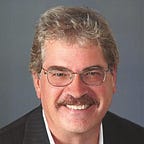The Wordsmith Who Saved the United States
On hallowed and tortured ground in 1863, Abraham Lincoln’s words forever defined the promise of a democratic nation
 With the possible exception of Thomas Jefferson, no elected leader in our nation’s history has preached and worshipped more effectively at the altar of the written word than Abraham Lincoln.
With the possible exception of Thomas Jefferson, no elected leader in our nation’s history has preached and worshipped more effectively at the altar of the written word than Abraham Lincoln.
Thankfully so, since at no other time were clear and inspiring words more needed than after the three-day bloodletting near the town of Gettysburg, Pennsylvania, during the Civil War. It fell on President Lincoln to deliver those words — a mere 272 — at a formal dedication ceremony for a new cemetery in Gettysburg on November 19, 1863.
Now, 157 years later, the political climate and chaotic discourse running throughout this country begs us to take yet another look at the now famous “dedicatory remarks” Lincoln was asked to give that day.
First, a few notes:
- Despite fatalities reaching over 51,000 men, the three-day battle at Gettysburg was not the decisive victory both the Union and the Confederacy hoped for. Two more years of fighting lay ahead before the Civil War would come to an end.
- The dedication ceremony occurred four months after the battle ended, and human remains were still being buried and reinterred as dignitaries came together to commemorate the grounds. In his Pulitzer Prize-winning book, Lincoln at Gettysburg — The Words That Remade America, historian Garry Wills writes of a nurse at the time who “shuddered at the all-too-visible ‘rise and swell of human bodies’” as they still lay desiccating in the fresh graves.
- Lincoln was not the designated keynote speaker for the ceremony. That honor went to Edward Everett, of Massachusetts, considered at the time to be America’s greatest living orator. Everett spoke for two hours before Lincoln rose to give his brief remarks.
- Before an estimated audience of 15,000, many of whom couldn’t hear all that was being said, Lincoln spoke from his own script for almost three minutes. He was interrupted by applause five times.
- Contrary to the popular myth, Lincoln did not write out his remarks on the back of an envelope while on a train in the few hours preceding the ceremony. He was a man who knew the power of his own rhetoric and gave great consideration to each word he ever wrote. As a writer, he based his craft on rewriting multiple drafts over a period of days. Gettysburg was no exception.
- Throughout what has come to be known as the Gettysburg Address, Lincoln never once mentions directly the Union or the Confederacy or slavery — three of the key components behind the struggle at hand. Likewise, he never mentions the town of Gettysburg itself. On this occasion, he was aiming for higher meaning and greater purpose — defense of the proposition that democracy on this Earth could work.
“Lincoln was an artist, not just a scholar.”
So wrote Garry Wills of Lincoln’s unmatched skill when it came to language and his often poetic choice of words at every turn, and one need not look hard to find examples that bear this out. In his book Writing the Gettysburg Address, author Martin P. Johnson records how Lincoln’s personal secretary John Nicolay described the Gettysburg Address as “one of the world’s masterpieces in rhetorical art.”
One hundred and fifty-seven years later, few would disagree.
Yes, Lincoln was a self-taught writer and storyteller and very well aware of the power of words. But he was also a politician, a lawyer by trade, and commander-in-chief in the middle of the deadliest war in a young nation’s history. In that light, it must be remembered that the Gettysburg Address was not preordained or heaven-sent. It was a man-made document that, while soon to become an immortal work of genius, started out with a more strategic goal in mind.
Abraham Lincoln was up for reelection the following year, 1864, and he was convinced that if he were not reelected the Union would not survive. The dedication of a new cemetery provided the perfect opportunity for him to state his case, and thus the Nation’s case, that the original proposition of a free and united nation was still worth fighting for. Now more than ever.
So, at two o’clock in the afternoon on November 19, it was finally Lincoln’s turn to speak. After being introduced, he rose from his seat on the speaker’s platform and stepped forward. Pulling out two folded pages from his coat, he waited patiently for the crowd to be quiet. Then slowly and deliberately he began to speak:
“Four score and seven years ago our fathers brought forth on this continent, a new nation, conceived in Liberty, and dedicated to the proposition that all men are created equal.
Now we are engaged in a great civil war, testing whether that nation, or any nation so conceived and so dedicated, can long endure. We are met on a great battle field of that war. We have come to dedicate a portion of that field, as a final resting place for those who here gave their lives that that nation might live. It is altogether fitting and proper that we should do this.
But, in a larger sense, we can not dedicate — we can not consecrate — we can not hallow — this ground. The brave men, living and dead, who struggled here, have consecrated it, far above our poor power to add or detract. The world will little note, nor long remember what we say here, but it can never forget what they did here. It is for us the living, rather, to be dedicated here to the unfinished work which they who fought here have thus far so nobly advanced. It is rather for us to be here dedicated to the great task remaining before us — that from these honored dead we take increased devotion to that cause for which they gave the last full measure of devotion — that we here highly resolve that these dead shall not have died in vain — that this nation, under God, shall have a new birth of freedom — and that government of the people, by the people, for the people, shall not perish from the earth.”
The reaction to his ‘brief remarks’ was swift and unanimous. Newspapers quickly circulated the text far and wide, and a stronger vision of Lincoln and the cause for which the Union was fighting for emerged.
Edward Everett wrote to the President the next day:
“I should be glad, if I could flatter myself that I came as near to the central idea of the occasion in two hours as you did in two minutes.”
Reactions like this certainly contributed to Lincoln’s winning reelection in 1864. Of course, the rest — as the cliché goes — is history.
The process, the spark, that lies at the heart of all human creativity is and always will be a mystery — trying to explain how and why someone chooses certain words or artful images to get across a bigger idea is like trying to define the wind. It can’t really be done.
What happened in and around Gettysburg in the year 1863 are facts. The words chosen by a master craftsman that November day are immortal. They will never lose their power. They are forever etched in stone as part of our nation’s heritage and uniqueness on the world stage. That, too, shall not perish.
